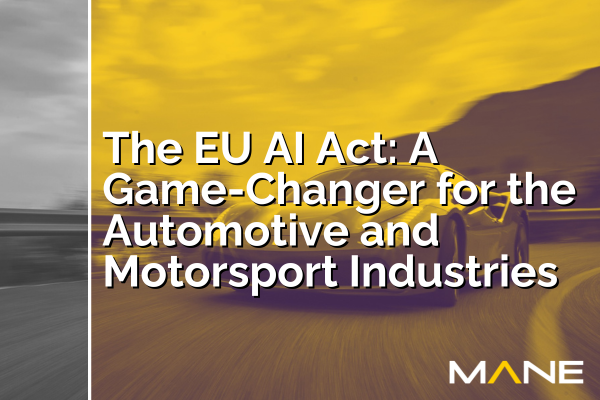The EU AI Act: A Game-Changer for the Automotive and Motorsport Industries
08 Aug, 20242minsThe European Union's Artificial Intelligence Act (AI Act), set to come into force on 2 A...

The European Union's Artificial Intelligence Act (AI Act), set to come into force on 2 August 2024, heralds a new era in AI regulation that will profoundly impact the automotive and motorsport sectors. As these industries increasingly leverage AI technologies for innovation and performance enhancement, comprehending the Act's implications is crucial for manufacturers, teams, and suppliers across the UK and Europe.
Key Considerations for Automotive and Motorsport:
1. High-Risk AI Systems:
The AI Act categorises certain AI applications in vehicles as high-risk, including safety components and systems used for autonomous driving. These will be subject to stringent requirements encompassing risk management, data governance, technical documentation, transparency, human oversight, accuracy, and cybersecurity. Manufacturers must ensure their AI systems comply with these regulations before entering the EU market.
For instance, an AI system controlling a vehicle's braking system would likely be classified as high-risk. Manufacturers would need to demonstrate that the system has been trained on diverse datasets, performs consistently across various driving conditions, and can be overridden by a human driver if necessary.
2. Testing and Certification:
High-risk AI systems will require conformity assessments and CE marking before deployment. For the automotive sector, this translates to additional testing and certification processes for AI-powered features such as advanced driver-assistance systems (ADAS) and autonomous driving capabilities.
This could involve rigorous testing in simulated environments and real-world conditions to ensure the AI system performs safely and consistently. Manufacturers may need to engage with notified bodies for third-party assessments, potentially extending development timelines and increasing costs.
3. Motorsport Innovations:
While the Act primarily focuses on road vehicles, its implications may extend to motorsport applications. Teams utilising AI for race strategy, vehicle optimisation, or driver assistance will need to carefully evaluate whether their systems fall under high-risk categories and ensure compliance if necessary.
For example, an AI system used to optimise pit stop timing based on real-time race data might not be classified as high-risk. However, an AI-powered traction control system that directly influences vehicle performance could potentially fall under the high-risk category, requiring compliance with the Act's provisions.
4. Data Management:
The Act emphasises the importance of high-quality data for training AI models. Automotive and motorsport organisations will need robust data management practices to ensure their AI systems are trained on diverse, representative, and error-free datasets.
This could involve establishing data governance frameworks, implementing data quality assurance processes, and ensuring data traceability. Organisations may need to invest in data cleansing tools and establish partnerships to access diverse datasets for training their AI models.
5. Transparency and Explainability:
For high-risk AI systems, there will be requirements around transparency and explainability. This could impact how AI decisions in vehicles are communicated to drivers and regulators, potentially affecting user interfaces and documentation.
Manufacturers might need to develop intuitive dashboards that explain AI decisions in real-time, such as why an autonomous vehicle chose a particular route or why a safety system intervened. This could also extend to providing detailed explanations of AI decision-making processes to regulators upon request.
6. Continuous Monitoring:
The Act mandates post-market monitoring for high-risk AI systems. Automotive manufacturers will need to implement systems for ongoing monitoring and reporting of their AI applications' performance and safety.
This could involve developing sophisticated telemetry systems to collect real-world performance data, establishing incident reporting mechanisms, and creating dedicated teams to analyse this data and make necessary adjustments to AI systems.
7. International Competitiveness:
As the first comprehensive AI regulation globally, the EU AI Act may set a precedent for other regions. Automotive and motorsport companies that adapt early may gain a competitive advantage in global markets.
UK-based companies, despite Brexit, may find compliance necessary to maintain access to the EU market. Moreover, demonstrating compliance with these stringent regulations could become a mark of quality and trustworthiness in the global marketplace.
Implementation Timeline:
While the Act enters into force in August 2024, its provisions will be phased in over time. Key dates for the automotive and motorsport sectors include:
• 2 August 2025: Compliance required for general-purpose AI models
• 2 August 2026: Most rules become applicable, including obligations for high-risk systems
• 2 August 2027: Obligations apply for high-risk systems defined in harmonised EU legislation (which may include certain automotive regulations)
Preparing for Compliance:
To prepare for the AI Act, automotive and motorsport organisations should:
1. Conduct a comprehensive AI inventory to identify systems that may fall under the Act's scope
2. Assess the risk level of each AI application, considering its intended use and potential impact
3. Review and update data governance practices, ensuring data quality, diversity, and traceability
4. Establish robust processes for AI system documentation and risk management
5. Invest in explainable AI technologies where necessary, particularly for high-risk applications
6. Train staff on AI ethics and compliance requirements, fostering a culture of responsible AI development
7. Engage with regulators and industry bodies to stay informed about evolving interpretations and guidelines
8. Consider establishing dedicated AI compliance teams or roles within the organisation
The EU AI Act represents both a significant challenge and a transformative opportunity for the automotive and motorsport industries. While compliance will require substantial effort and investment, it also provides a framework for developing trustworthy AI systems that can enhance safety, performance, and innovation in these sectors.
By proactively addressing the Act's requirements, companies can position themselves at the forefront of responsible AI adoption in mobility and racing technologies. This could lead to increased consumer trust, regulatory approval, and ultimately, a competitive edge in the rapidly evolving landscape of AI-powered automotive and motorsport innovation.
As the implementation date approaches, it is crucial for industry stakeholders to stay informed, engage in dialogue with regulators, and collaborate within the sector to navigate this new regulatory landscape effectively. The EU AI Act may well become the gold standard for AI regulation globally, and early adopters in the automotive and motorsport sectors stand to benefit significantly in the long run.


